Vyvanse Water Titration in 8 Steps

Vyvanse (Generic: Lisdexamfetamine)
Vyvanse (Elvanse, Tyvense, Venvanse) is a long-acting ADHD medication of the Adderall family. Per the manufacturer, Vyvanse can be safely administered by mixing the contents in a liquid and consuming the mixture. Water-titration can only be done with Vyvanse because of its pharmacokinetic properties. Vyvanse is a prodrug, or a medication that, after administration, is metabolized (i.e., converted within the body) into a pharmacologically active drug (dextroamphetamine).
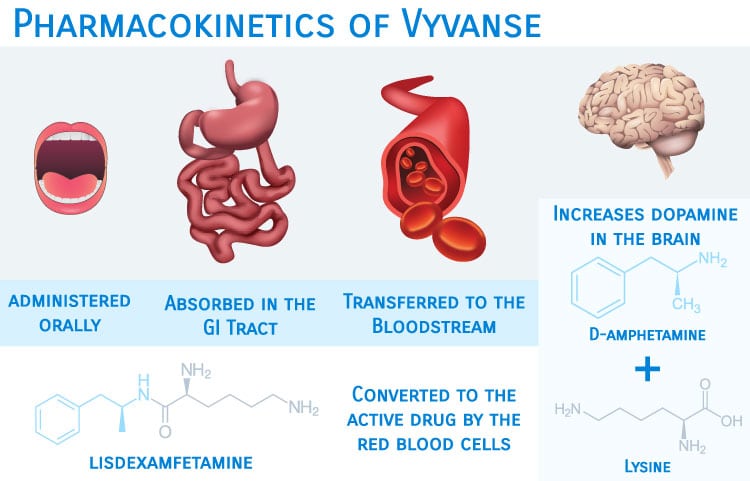
Water-titration should not be performed with other long-acting stimulants (such as Adderall XR, Dexedrine, Mydayis, Aptensio XR, Concerta, Focalin XR, Ritalin LA, or Metadate ER).
Steps:
- 1. Obtain a proper water bottle. You will need a large (wide) mouth, graduated water bottle with a leak-proof lid. The wide mouth is necessary to avoid losing medication when opening the capsule. The markings, or printed graduations, assist with the proper dosing. The tight seal on the lid will prevent loss of the medication when shaking or transporting.
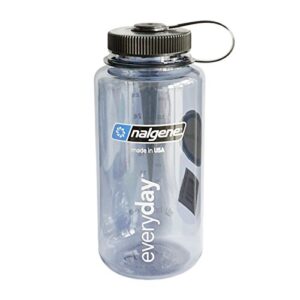
- 2. Label the water bottle using a permanent marker. You do not want others to “accidentally” consume your Vyvanse. Make sure to always place the bottle in a safe, secure place, even if there isn’t any medication in it (there still may be medication residue).
- 3. Add water, or another clear liquid, to the clean, empty water bottle.
- 4. Take a Vyvanse capsule and slowly open it on top of the opened water bottle. Pull at the capsule ends with the tips of your fingers. The powder should fall into the bottle. Make sure to remove all the contents of the capsule.
- 5. Secure the lid on the bottle.
- 6. Shake the bottle of water for 15-30 seconds.
- 7. Drink the amount of water for the prescribed dose. Therefore, if you have a 70 mg capsule and mix it in 700 mL of water, then 30 mg of Vyvanse would be 300 mL (10 mg = 100 mL).
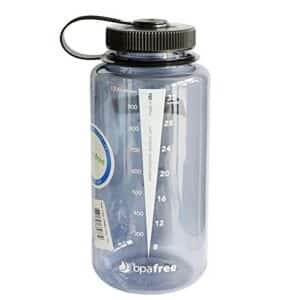
- 8. Preserve the remaining liquid in a refridgerator. The medication should be viable for at least 2-3 days.
DEA Increases Production Quota for Vyvanse (lisdexamfetamine)
The Drug Enforcement Administration (DEA) has recently authorized an increase in the production quota for lisdexamfetamine, a crucial medication used to treat Attention Deficit Hyperactivity Disorder (ADHD), by approximately 23.5%. This adjustment raises the allowable production from 26,500 kilograms to 32,736 kilograms. Lisdexamfetamine, commonly known by the brand name Vyvanse in the United States, as Elvanse in parts of Europe, and as Tyvense in other regions, has faced significant shortages, impacting patients who rely on this medication for their daily symptom management.
The DEA’s decision is aimed at alleviating these shortages and enhancing the availability of this crucial ADHD treatment across various markets. While this increase in the production quota is a positive step, it’s important to understand that there might be a delay of a few weeks to a couple of months before patients notice a significant change in the availability of Vyvanse and its international counterparts at pharmacies. This time is necessary for manufacturers to increase production and distribute the medication effectively to meet the demand.
This initiative addresses the immediate need for increased medication supply and reflects ongoing efforts to support individuals affected by ADHD by ensuring they have access to essential treatments.

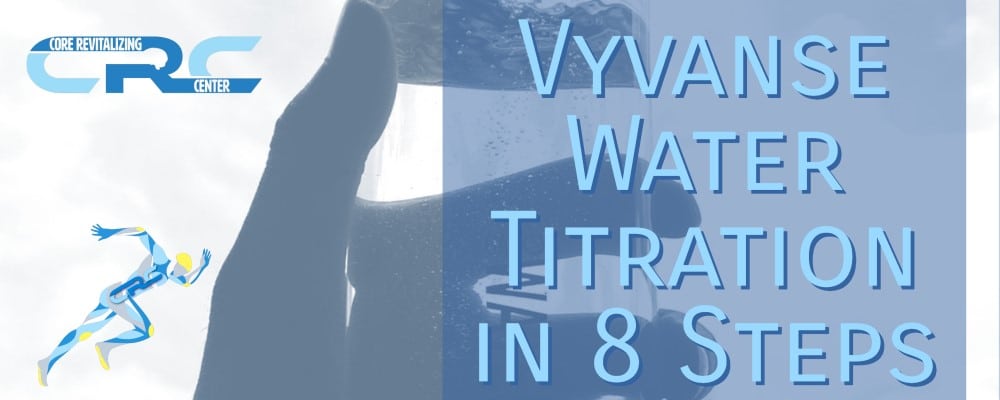
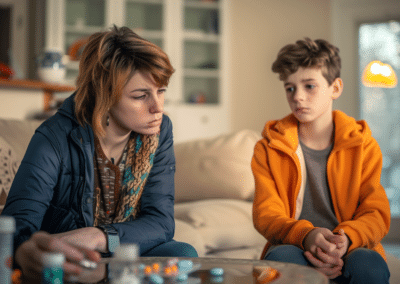
I am looking for ways to suggest to my son as he is showing signs of Vyvanse dependency. I’d like to advise him to slowly wean off it. I see this way of diluting the vyvanse into water a potential way to slowly reduce his dosage with more control. Any suggestions.
Are you concerned about stimulant dependency or tolerance?
Hi Sarah,
I’m not a physician but an adult who takes stimulants for her ADHD for a while now. I also talk to lots of other people taking stimulants for their ADHD.
My general advice to prevent dependency and tolerance is to not take Vyvanse (or any other stimulant) during the weekends. It really is amazing how big of an impact this change has made for me and to people I gave this advice to. If the need arises to take something (like an event) of course it can be taken on a Saturday or Sunday, but the positive impact of taken breaks is astonishing.
To your question: while I think Dr. Halim’s question is important, in the end I think the solution might be the same. It’s the one I mentioned above. The problem is that taking your son off his meds from one day to the next would be very bad, so please don’t do that!
I’d suggest to reduce the dosages slowly. For that you should ask your son’s GP or psychiatrist to give you lower dosages (only to be taken during the weekends and the “normal” dosage during the week) or even better, get a fine (often called gram) scale. Then open the capsule and measure it exactly. Let’s say he’s on 30mg. Then reduce 6mg (this is 20% of the overall dosage-don’t reduce more at once!). It’s tricky and you need to make sure it’s mg on the scale. Separate the 6mg, then put the rest back into the capsule. It might take some practice.
Only reduce on the weekends. Repeat that for at least 2 weekends. After that reduce 6mg more, so that only 18mg remain in the capsule. Again, I can’t stress this enough, do that for only the weekends.
Your son shouldn’t know you reduce the dosage or he might react badly. Either way, his symptoms will act up during the weekends, so be prepared. It’ll be difficult for everybody involved.
Keep reducing the meds until either nothing is inside the capsules anymore or only 6mg remains. Nothing during the weekend–as I mentioned already–is in my opinion the best option.
You will realize that after a while Vyvanse will have a better effect (again) during the week. If it’s dependency though (and the difference to tolerance can be hard to tell), you should try talking to your son (depending how old he is) and explain to him what dependency is. It’s important to tell him, he’s not at fault and that even a lot of adults struggle with this. Maybe you should talk with him about it anyway, but telling him you’re reducing the meds can make things difficult. It also very much depends on how old he is. After all, this is a medication that often is a necessity. And the more you get used to the positive effects, the more you rely on it. That’s just normal.
Finally, I would encourage you, to read into supplements for ADHD. There are great information on the web. I don’t want to promote here any websites or specific products but I’ve realized that taking magnesium helps me a lot. If you do that, please educate yourself how much to take/ give and what needs to be taken as well with it, e.g. calcium (not at the same time and in low dosages. Again, please educate yourself).
Additionally, you should get your son checked for deficiencies. Especially, vitamin D and iron. If he’s suffering from allergies or asthma, like most people with ADHD do, there are also additional supplements that can have a huge impact (because children and adults with ADHD have often problems in that regard).
I tended to dismiss these things because I believed in medication. But if the body is missing certain things, the best way is to supplement it and things get better (with or without medication).
Just remember not to supplement blindly. Get blood tests first(!). Also know, that supplements (and even certain foods) can interact with medications.
I hope I could help.
Warm greetings from Germany.
Hello,
How old is your son? If he is a minor, I would recommend taking him to the doctor/speaking with him about the things he is feeling.
I know that I take my Vyvanse (28F) even on the weekends. It’s a bit funny to me to regulate my medication/brain on “weekdays” to be productive at work, and feel such a difference, but not to take it when I may want to work on personal projects or hobbies?
I am studying Social Work at the moment, and a topic that arises (and I relate to) is feeling out of control/like I don’t have any agency. There was a time where my mom had been worried about me, and created her own narrative about the situation. One day when I brought a few things up, it was clear she had listened to one person’s story and held onto that “pathway.” It would have helped me if I was asked and able to help fill in gaps, instead of her filling them in with information that she sourced herself.
For me, “how are you” is not great. Better is “Do you need to drink some water? Would you like a snack? What can I do to help you?”
I wish you the best of luck!
“It’s a bit funny to me to regulate my medication/brain on “weekdays” to be productive at work, and feel such a difference, but not to take it when I may want to work on personal projects or hobbies?”
Exactly this! Thank you for sharing, and I’m sorry that you had do deal with a controlling parent that wouldn’t let you use your voice. It’s definitely a sensitive situation for minors, and I think it’s cool that you’re studying Social Work- as much as it sucks to go through, I believe children benefit more from having people in that field that have relatable experiences; it’s tough for people without those to fully empathize or comprehend what it’s like.
I also really like the other questions you prefer than the far too vague question of “how are you”. Its far easier to respond to honestly with a more direct/in-depth question and I think it shows that the person asking cares more.
I just wanna say something in response to all these comments/suggestions (for whatever my opinion is worth) ADHD is not a condition that goes away, it becomes incredibly difficult to be approved for medication as you get older.
I began treatment for ADHD when I was 4yo, and stopped my meds around the age of 18 and within a year began having panic attacks. Now at 27yo I have been officially diagnosed with panic disorder, by a Neuropsychologist (someone who obtained a doctorate in psychology and then specialized in neurology (pretty sure that’s over 10 years min.)) Who determined that my panic disorder was caused by the fact that I was not medicated for ADHD.
The different medications can definitely be quite daunting and it’s understandable to be worried about tolerance.
I apologize for the long message but i have had a lot of trouble with Benzodiazepine addiction, which I only started taking because I was perscribed those sooner than Adderall/Vyvanse.
Everything I’m saying is based on my own personal experience, and is not professional, but there’s absolutely nothing wrong with doing your own due diligence and asking you doctors questions. Be safe, take care.
Miguel,
I just wanted to say I appreciate your input. While I’m disappointed you had to go through a similar struggle, it means a lot to know that I’m not alone in how the ADHD manifested other disorders while untreated. I hope you are doing well and that things are getting easier to handle.
This will be quite long, but I felt it was necessary to share my experiences and concerns as well.
I (29F) wasn’t diagnosed with ADHD until I was 18, and by that time the cycle not getting appropriate treatment had given me severe depression and anxiety disorders, both of which I was diagnosed with before the ADHD. I was unaware that this is a common issue with untreated ADHD as it’s not really talked about, and it constantly irritates me that so many of us end up with other disorders due to the lack of education and awareness.
Since Vyvanse was the only medication that worked for me (proven after many trials with other medications) and a lack of appropriate insurance to cover the insanely steep cost, I had to opt out of treatment for a few years. After I was finally financially stable, I found my insurance still wouldn’t cover it, but could no longer only treat the anxiety and depression, since I was ignoring the main issue.
It took me YEARS to finds a doctor that would take my ADHD diagnosis seriously after not being medicated for so long, and to properly prescribe the medication I needed, mostly due to the insurance red tape, but also due to medical gaslighting and blatant disregard. I’m still on other medications for the anxiety and depression as those are too severe to be solely treated by the ADHD medications now, and it breaks my heart to hear other people are in similar positions.
It upsets me to see so many people, particularly neurotypical parents, under the assumption that ADHD will go away or “get better” with age, especially when I see parents talking about taking their child off of medications because it doesn’t look like they need it any longer. Like with most medications, symptoms will lessen with the appropriate medications, but that doesn’t mean the disorder has been resolved or “fixed”, it just means the medication is working. While the concern for medication dependency and abuse is valid, I do not believe parents should be the ones making the decisions on whether the dose needs to be adjusted (at least not with older children that can communicate/advocate for themselves). That is something that needs to be discussed between the doctor and patient, as it could be a misunderstanding on the parent’s side. I know that my family would believe I have a dependency on my Vyvanse (if I was still living with them), because of how my ADHD manifests without medication. My executive dysfunction gets extremely disruptive and I end up unable to do anything, even my beloved hobbies that usually spark my interest and motivation. As such, I do need to take Vyvanse on the weekends, and ensure that the dose I take during the week for work can lasts long enough to go through the work day and into the evening enough to do “normal” tasks, like cooking/cleaning. I prefer the titration method because I can take a lower dose on the weekends and still be productive, but without the more intense focus I require for work.
I think anyone with ADHD needs to be the one to decide what is and isn’t working for them, and have open and honest communication with their doctor first, then their parents, if necessary. I’ve seen too many parents take on the wrong preconceptions of medications and end up harming their child by trying to control something they don’t understand. It takes a lot of time and experimentation to find the right dose and treatment, and I think more people should be open to the varied medication schedules and doses. Since it’s been over a year since Sarah posted her comment and there were no updates, I sincerely hope that her son is doing alright and is still being properly medicated, whether lowering the dose helped or finding a different solution.
All of the experiences shared by the other adults with ADHD here are completely valid; there is no one “correct” way to deal with this. I hope others that find this article are able to find the option that works best for them. And if anyone is struggling with a real dependency or addiction, please utilize the support options out there, and be safe.
I would like to thank all for the experiences shared. I was only diagnosed when I turned 64. I somehow made things happen before with various consequences that were attributed to the general ‘stress’ and the vague notion I have to work on these symptoms. I now have taken dexamphetamine starting at 20mg to 30 mg and moved from there to Vyvanse 60 mg and 70 mg currently. Whilst initially I thought that was great I found later on that it was exhausting to keep up. Also the dry mouth most days and somehow how a low point in the afternoon around 2-3 pm which can be partially remediated with a powernap and rest for 20-30 mins. I am grateful to find out about the titration method and will try it as I find it annoying not being able to control the dosage as sometimes the 70 mg is too much. Of course anxiety is a demon not easily conquered. It is always good to dig deep inside to see the causes and triggers, often early childhood stuff and things in need of resolving and changing. As a med I do recommend medical cannabis which once again requires experimentation to work out what works best. Indeed ADHD will not cure but requires careful management so that this type of brain can function quite well in life. Amazing how many people are affected by this condition which sometimes makes one think to view this as being different than just a condition and, indeed, a mental illness.